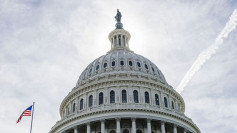The U.S. Senate passed a controversial bill to extend government spy powers for another two years, capping a tumultuous journey through Congress just hours after the midnight Friday expiration date. The bill passed 60-34 through the upper chamber with bipartisan support, despite opposition from a coalition of senators on the far left and right of their parties, including Sens. Bernie Sanders, I-Vt., and Mike Lee, R-Utah.
The measure, which President Joe Biden is expected to sign into law, would extend Section 702 of the Foreign Intelligence Surveillance Act (FISA), allowing the federal government to gather communications between people living outside and inside the U.S. without a warrant. While intelligence officials argue that the law plays a vital role in identifying and combatting national security threats, privacy advocates have long pushed for the addition of a warrant requirement and raised concerns about improper use of the surveillance law.
The bill's passage through Congress was complicated by former President Donald Trump, who wields immense influence over Congressional Republicans. Trump posted on Truth Social that Republicans should "KILL FISA," creating unlikely bedfellows between civil-liberty-minded Democrats and Republicans concerned about the expansion of government surveillance powers.
In the Senate, consideration of the bill dragged out for days, pitting key Democrats against leadership and the White House. Senate Majority Whip Dick Durbin, D-Ill., Sen. Ron Wyden, D-Ore., and several conservative senators proposed amendments to the bill that the Biden Administration actively campaigned against. One major flashpoint became a provision authored by House Intelligence Committee Chair Mike Turner, R-Ohio, which critics argue would dramatically expand surveillance authorities.
"This amendment that was stuffed into the bill by the chairman in the House is one of the worst ideas I've seen," Wyden said Thursday. "It is sweeping in terms of the number of people it brings into this position of Big Brother and having to spy for their government."
However, leaders said those changes in the Senate weren't necessary and would hurt American interests. They also feared that one of the amendments might actually pass if put up for a vote, forcing the bill back to the House for reconsideration and causing Congress to miss the expiration deadline.
"It's just unnecessary and destroys the purpose of the program," Sen. Marco Rubio, R-Fla., the top Republican on the Senate Intelligence Committee, said Thursday.
Despite the opposition, multiple amendments were put up for a vote Friday night and failed, including those proposed by Durbin and Wyden. Because any one senator can prevent leadership from speeding up the process of considering legislation, the Senate slogged through much of the time necessary to pass the bill in the upper chamber and finally passed it early Saturday morning.
The House had previously passed the reauthorization bill 273-147 last week after three failed attempts. The process was complicated by the new version, which proposed a two-year reauthorization instead of five years, a change that helped appease conservatives who had initially revolted against the legislation.
As the FISA reauthorization bill heads to President Biden's desk, the debate surrounding the balance between national security and privacy concerns remains a contentious issue. While supporters argue that Section 702 is a critical tool for safeguarding national security, critics maintain that the law requires significant reforms to protect the privacy rights of American citizens.






